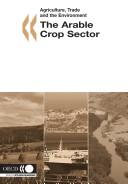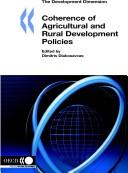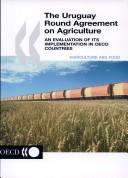| Listing 1 - 10 of 10 |
Sort by
|
Book
Year: 1989 Publisher: Bradford University of Bradford
Abstract | Keywords | Export | Availability | Bookmark
 Loading...
Loading...Choose an application
- Reference Manager
- EndNote
- RefWorks (Direct export to RefWorks)
Book
Year: 1989 Publisher: Bradford University of Bradford
Abstract | Keywords | Export | Availability | Bookmark
 Loading...
Loading...Choose an application
- Reference Manager
- EndNote
- RefWorks (Direct export to RefWorks)
Book
Abstract | Keywords | Export | Availability | Bookmark
 Loading...
Loading...Choose an application
- Reference Manager
- EndNote
- RefWorks (Direct export to RefWorks)

ISBN: 1280356642 9786610356645 9264009973 9264009965 9789264009974 Year: 2005 Publisher: Paris : Organisation for Economic Co-operation and Development,
Abstract | Keywords | Export | Availability | Bookmark
 Loading...
Loading...Choose an application
- Reference Manager
- EndNote
- RefWorks (Direct export to RefWorks)
This study takes an in-depth look at the arable crops sector in OECD countries and draws some conclusions about the impacts of agricultural support policies, trade liberalisation, agri-environmental payments, and agri-ennvironmental regulations. It contains economic and structural data, agri-environmental indicators for the arable crops sector, and analysis of the policy measures supporting arable crops farming and addressing environmental issues both at the aggregate country level and regional levels. This is the third in a series of in-depth studies being undertaken by the OECD to investigate the linkages between agriculture, trade and the environment. The first study on the pig sector was published in 2003, and the second study on the dairy sector was published in 2004.
Agriculture -- Environmental aspects -- Government policy -- OECD countries. --- Agriculture -- European Union countries. --- Agriculture and state -- European Union countries. --- Crops -- European Union countries. --- Environmental policy -- OECD countries. --- Agriculture --- Environmental policy --- Crops --- Agriculture and state --- Earth & Environmental Sciences --- Agriculture - General --- Government policy --- Environmental aspects --- Agricultural crops --- Crop plants --- Farm crops --- Industrial crops --- Farming --- Husbandry --- Farm produce --- Plants, Cultivated --- Agronomy --- Crop science --- Plant products --- Industrial arts --- Life sciences --- Food supply --- Land use, Rural
Book
ISBN: 1283319799 9786613319791 9264113223 9264113096 Year: 2011 Publisher: Paris : OECD,
Abstract | Keywords | Export | Availability | Bookmark
 Loading...
Loading...Choose an application
- Reference Manager
- EndNote
- RefWorks (Direct export to RefWorks)
Turkey is an important producer and exporter of agricultural commodities on world markets and is estimated to be the world’s 7th-largest agricultural producer. Although the economic importance of agricultural sector relative to the industrial and service sectors has been declining, agriculture still remains a key part of Turkey’s society, employing about one quarter of the workforce and generating most of income and employment in rural areas. Agricultural policies in Turkey have evolved significantly over time and the new Agricultural Law agreed in 2006 aims to align Turkey’s agricultural policies with those of the European Union. The main purpose of the study is to evaluate recent policy developments in the context of a broader review of policy developments since the implementation of the Agricultural Reform Implementation Project (ARIP) in 2001. This study also discusses several emerging issues and challenges for Turkish agricultural policies, and offers key policy recommendations.
Agriculture -- Economic aspects -- Turkey. --- Agriculture and state -- Turkey. --- Agriculture and state. --- Agriculture and state --- Agriculture --- Business & Economics --- Agricultural Economics --- Economic aspects --- Farming --- Husbandry --- Industrial arts --- Life sciences --- Food supply --- Land use, Rural --- Turkey

ISBN: 9264023887 9786610606917 1280606916 9264023895 Year: 2006 Publisher: Paris : OECD,
Abstract | Keywords | Export | Availability | Bookmark
 Loading...
Loading...Choose an application
- Reference Manager
- EndNote
- RefWorks (Direct export to RefWorks)
Agriculture and state --- Rural development --- Politique agricole --- Développement rural --- Congresses. --- Government policy --- Congrès --- Politique gouvernementale

ISBN: 9789264023888 9789264023895 9786610606917 9264023895 Year: 2006 Publisher: Paris : OECD,
Abstract | Keywords | Export | Availability | Bookmark
 Loading...
Loading...Choose an application
- Reference Manager
- EndNote
- RefWorks (Direct export to RefWorks)
Agriculture is no longer the dominant sector in rural economies in OECD countries. But it is still the key sector in managing the land, and many ancillary industries are dependant on agriculture. Both agricultural and rural policy are changing to respond to society's concerns regarding food safety, food security, animal welfare, environmental protection and the viability of rural areas. These proceedings of the OECD Workshop on Coherence of Agricultural and Rural Development Policies examined these issues through thematic studies and country experiences. They find that rural is not synonymous with agriculture and agriculture is not always rural as much agricultural production occurs in peri-urban areas. The goals of agricultural and rural policies are different, but policy coherence is essential.
Developing countries: agricultural and food problems --- Agriculture and state --- Rural development --- Government policy --- Community development, Rural --- Development, Rural --- Integrated rural development --- Regional development --- Rehabilitation, Rural --- Rural community development --- Rural economic development --- Community development --- Economic development --- Regional planning --- Citizen participation --- Social aspects
Digital
ISBN: 9789264023895 Year: 2006 Publisher: Paris Organization for Economic Cooperation and Development
Abstract | Keywords | Export | Availability | Bookmark
 Loading...
Loading...Choose an application
- Reference Manager
- EndNote
- RefWorks (Direct export to RefWorks)
Agriculture is no longer the dominant sector in rural economies in OECD countries. But it is still the key sector in managing the land, and many ancillary industries are dependant on agriculture. Both agricultural and rural policy are changing to respond to society's concerns regarding food safety, food security, animal welfare, environmental protection and the viability of rural areas. These proceedings of the OECD Workshop on Coherence of Agricultural and Rural Development Policies examined these issues through thematic studies and country experiences. They find that rural is not synonymous with agriculture and agriculture is not always rural as much agricultural production occurs in peri-urban areas. The goals of agricultural and rural policies are different, but policy coherence is essential.

ISBN: 1280029897 9786610029891 9264192182 9264186263 Year: 2001 Publisher: Paris : OECD Publishing,
Abstract | Keywords | Export | Availability | Bookmark
 Loading...
Loading...Choose an application
- Reference Manager
- EndNote
- RefWorks (Direct export to RefWorks)
The Uruguay Round Agreement on Agriculture (URAA) was a turning point in the reform of the agricultural trade system. It imposed disciplines on trade-distorting domestic policies and established new rules in the areas of market access and export competition. How effective have the three disciplines contained in the URAA been in bringing about a reduction in the level of production-related support and protection? Which elements of the disciplines have proved effective and which ineffective? What policy lessons can be drawn from the experience so far? What might be inferred about opportunities and challenges for further trade liberalisation? This report provides some answers to these questions for all OECD countries. A key conclusion of the report is that the immediate quantitative effects of the URAA on trade and protection levels have been modest. The reasons for this include the weakness of many specific features of the URAA including implementation and methodological issues. Countries have already embarked on a new round of multilateral trade negotiations on agriculture. The challenge facing policy makers is to build upon the foundation of the URAA to further reduce trade distortions. This requires strengthening the disciplines already established under the URAA and addressing those weaknesses of the current agreement which have been identified in this study.
Agriculture and state -- OECD countries. --- Produce trade -- OECD countries. --- Tariff on farm produce -- OECD countries. --- Uruguay Round (1987-1994) Produce trade -- OECD countries. --- Uruguay Round (1987-1994). --- Produce trade --- Agriculture and state --- Tariff on farm produce --- Uruguay Round --- Farm produce --- Tariff on agricultural products --- Agrarian question --- Agricultural policy --- Agriculture --- State and agriculture --- Economic policy --- Land reform --- Agricultural marketing --- Agricultural products --- Food trade --- Food industry and trade --- Commodity exchanges --- Tariff --- Government policy --- Economic aspects --- Cycle d'Uruguay --- Gyros Ourougouaēs --- Gyros tēs Ourougouaēs --- Jawlat Ūrūjuwāy --- Multilateral Trade Negotiations, the Uruguay Round --- Negociaciones Comerciales Multilaterales, Ronda Uruguay --- Négociations commerciales multilatérales, Cycle d'Uruguay --- Putaran Uruguay --- Ronda Uruguay --- Rō̜p ʻUrukwai --- Uruguai Raundŭ --- Uruguay Round of MTNs --- Uruguay Round of Multilateral Trade Negotiations --- Uruguay Runde --- Urugwai Raundŭ --- Wu-la-kuei hui ho --- Uruguay
Book
ISBN: 926400999X 9264009981 Year: 2005 Publisher: Paris : OCDE-Organisation de cooperation et developpement economiques,
Abstract | Keywords | Export | Availability | Bookmark
 Loading...
Loading...Choose an application
- Reference Manager
- EndNote
- RefWorks (Direct export to RefWorks)
Cette étude propose une analyse approfondie du secteur des grandes cultures des pays de l’OCDE et formule des conclusions sur les incidences des politiques de soutien à l’agriculture, de la libéralisation des échanges, des paiements agro-environnementaux et des réglementations agro-environnementales. Elle présente par ailleurs des données économiques et structurelles, ainsi que des indicateurs agro-environnementaux spécifiques au secteur des grandes cultures, et analyse les mesures prises par les pouvoirs publics pour soutenir ce secteur et faire face aux problèmes environnementaux qui se posent tant à l’échelle nationale qu’à l’échelle régionale. Cette publication est la troisième d’une série d’études de fond que l’OCDE a entreprise dans le but d’étudier les liens entre agriculture, échanges et environnement. La première étude, consacrée au secteur porcin, est parue en 2003, tandis que la deuxième, qui portait sur le secteur laitier, a été publiée en 2004.
Agriculture --- Environmental policy --- Crops --- Agriculture and state --- Environmental aspects --- Government policy --- Agricultural crops --- Crop plants --- Farm crops --- Industrial crops --- Farming --- Husbandry --- Farm produce --- Plants, Cultivated --- Agronomy --- Crop science --- Plant products --- Industrial arts --- Life sciences --- Food supply --- Land use, Rural
| Listing 1 - 10 of 10 |
Sort by
|

 Search
Search Feedback
Feedback About UniCat
About UniCat  Help
Help News
News